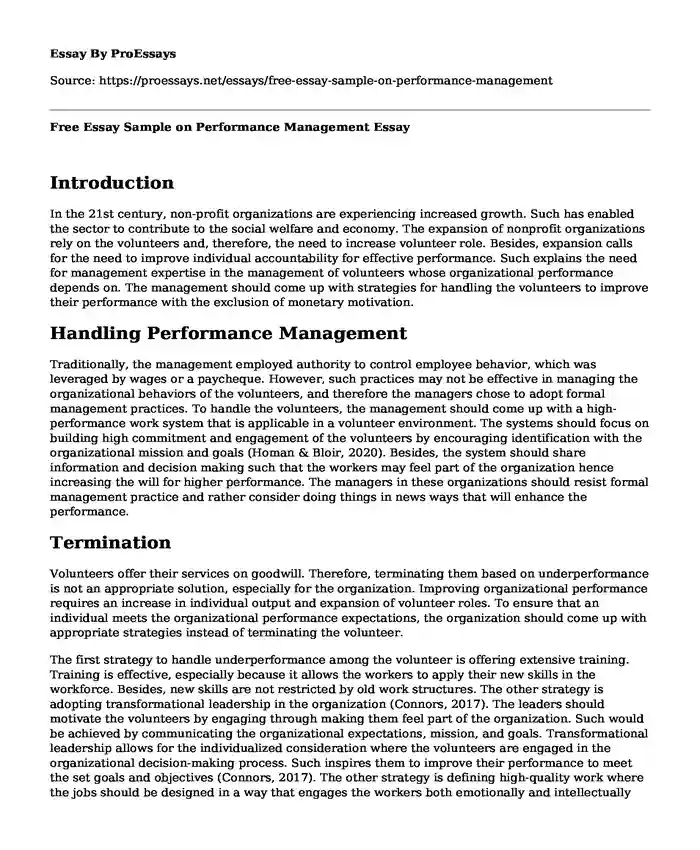Introduction
In the 21st century, non-profit organizations are experiencing increased growth. Such has enabled the sector to contribute to the social welfare and economy. The expansion of nonprofit organizations rely on the volunteers and, therefore, the need to increase volunteer role. Besides, expansion calls for the need to improve individual accountability for effective performance. Such explains the need for management expertise in the management of volunteers whose organizational performance depends on. The management should come up with strategies for handling the volunteers to improve their performance with the exclusion of monetary motivation.
Handling Performance Management
Traditionally, the management employed authority to control employee behavior, which was leveraged by wages or a paycheque. However, such practices may not be effective in managing the organizational behaviors of the volunteers, and therefore the managers chose to adopt formal management practices. To handle the volunteers, the management should come up with a high-performance work system that is applicable in a volunteer environment. The systems should focus on building high commitment and engagement of the volunteers by encouraging identification with the organizational mission and goals (Homan & Bloir, 2020). Besides, the system should share information and decision making such that the workers may feel part of the organization hence increasing the will for higher performance. The managers in these organizations should resist formal management practice and rather consider doing things in news ways that will enhance the performance.
Termination
Volunteers offer their services on goodwill. Therefore, terminating them based on underperformance is not an appropriate solution, especially for the organization. Improving organizational performance requires an increase in individual output and expansion of volunteer roles. To ensure that an individual meets the organizational performance expectations, the organization should come up with appropriate strategies instead of terminating the volunteer.
The first strategy to handle underperformance among the volunteer is offering extensive training. Training is effective, especially because it allows the workers to apply their new skills in the workforce. Besides, new skills are not restricted by old work structures. The other strategy is adopting transformational leadership in the organization (Connors, 2017). The leaders should motivate the volunteers by engaging through making them feel part of the organization. Such would be achieved by communicating the organizational expectations, mission, and goals. Transformational leadership allows for the individualized consideration where the volunteers are engaged in the organizational decision-making process. Such inspires them to improve their performance to meet the set goals and objectives (Connors, 2017). The other strategy is defining high-quality work where the jobs should be designed in a way that engages the workers both emotionally and intellectually through reducing ambiguity.
Conclusion
Handling volunteers in a workplace can prove to be hectic because they provide human labor on a free will. Therefore, the traditional method of exercising authority in return for pay does not apply in this case. Sometimes, the organization faces various challenges, such as underperformance among the volunteers. Such prompts for the need of coming up with strategies to enhance their performance because terminating them will not add any value to the organization. Such strategies include the application of transformational leadership, defining high-quality work, training, and engaging the volunteers in the organizational decision making processes.
Reference
Connors, T. D. (Ed.). (, 2017). The volunteer management handbook: Leadership strategies for success (Vol. 235). John Wiley & Sons. ISBN: 978-1-118-12742-1
Homan, D., Epley, H. K., & Bloir, K. L. (2020). Are volunteers competent in positive youth development? Perceptions from three stakeholder groups. Journal of Youth Development, 15(4), 68-86.
https://doi.org/10.5195/jyd.2020.742.
Cite this page
Free Essay Sample on Performance Management. (2023, Dec 07). Retrieved from https://proessays.net/essays/free-essay-sample-on-performance-management
If you are the original author of this essay and no longer wish to have it published on the ProEssays website, please click below to request its removal:
- Analysis of Ability to Deal with Work Demands - Paper Example
- The Support of the Stakeholders and the Implementation Process of Evidence-Based Practice
- Starbucks Restaurants Evaluation Paper Example
- Marketing Debate on Product Development Paper Example
- Essay Example on Maximizing Team Performance With Lean System: Achieving Goals Together
- Essay Example on Workplace Violence: Understanding & Mitigating Factors
- Ethics Education: Challenges of Being Honest in Business - Essay Sample







